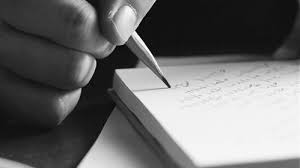I get this question a lot in my critique groups. How long are my chapters supposed to be?

In the Good Ol’ Days, back when readers appreciated a nice turn of phrase and a complicated, well-constructed sentence, chapters were far longer. The authors would write until they’d said what they wanted to say, then they’d start another chapter. Nowadays, your reader isn’t going to hang on that long. They’ll take one look at that thick chapter and toss your book down in favor of one with more manageable chapters.
Today’s readers want something bite-sized that they can read at the doctor’s office, at the pool, or just before bed. That averages out to be between 10 and 20 minutes of reading time–and that falls somewhere between 2,000 and 5,000 words. Most authors aim for the lower end of the scale and end each chapter with a page-turning twist. That way, when your reader thinks “maybe just one more chapter…” they will know it’s not going to take that long to finish (and maybe they’ll end up getting hooked into the chapter after that, too).
So keep it short, partner.
I’ve been asked to join the Greenville Library’s Southern Author Expo in two weeks.

There are 5 speakers and 19 of us “normal” authors, who will be manning tables and selling copies of our books. I will be taking copies of both Under Western Skies and Over Western Trails, as well as my alter ego’s anthology Carolina Crimes: Rock, Roll, & Ruin.
If you’re in the Greenville area on Saturday, January 21, stop by and say ‘howdy!”
We drove up into the mountains Sunday after getting back from Edisto Island. Here are some photos from the trip:










I’m reading Story Genius by Lisa Cron, recommended by one of our sessoion presenters at the recent Women Writing the West Conference. It’s all about how you must dig deep into the past of your protagonist and find out what actually needs to be driving your stories. Cron says that the plot is not the story and that’s the problem with a lot of authors who never see their work in print. They create a long series of events with nothing driving them. I’m going slowly with this book because it’s so deep. I have to read a couple of chapters, then think about what I’ve read and let it percolate for a while.
The key to understanding what drives your story, according to Cron, is to understand what’s driving your protagonist. What are their deepest desires and what misbeliefs are keeping them from attaining those desires? If you can figure out what’s driving your hero, you can create a story that readers can’t put down because they probably have experienced the same desires or seen them in someone familiar. Just writing down a series of exciting events won’t do it because the reader won’t feel connected to the protagonist and won’t care.
I’m not going to summarize the whole book because I want you to read it yourself so you can follow the excellent advice within. I’m going to be reading Cron’s other writing textbooks as well, and I may review them here for you later.

So my query letter got chosen out of the slush pile for Jericho Writers Slushpile Evaluation session next week – w00t!

I’ll be learning whether my query letter is effective and if not, how to fix whatever’s wrong. Here are some tips on making an effective query letter.
- Find the right agent. All agents have a wish-list, either on the website or on social media somewhere. It’s not hard to find. Before you send out that query letter, make certain what you’ve written is what that agent is looking for.
- Spell the agent’s name correctly. You may call them by their first name or Mr/Mrs Whatever — but be sure it’s spelled properly. Take the time to do a bit of research and double-check yourself.
- If you have an edge, say so. If you met them at a conference or were recommended by one of their authors, by all means brag a bit. Certainly if they requested your pages, mention that right at the first. If you’re just querying blindly, say something neutral like “I have an adult science fiction novel that I thought you might be interested in…”
- Research the agent. Find out something you can mention in your letter, like they’re looking for something edgy and dark, or they prefer happily-ever-afters. It’ll say something on their website that you can use to show them you’ve looked them up carefully.
- Your pitch should be one to two paragraphs max. If you can’t condense your story down that short, you need to rethink your plot. Pretend you’re describing a movie to a friend who’s on their way out and just give the bones of the thing. Never mind the subplots, plot twists, backstory, and anything else not essential to understanding the basic plot.
- If you have writing credentials, mention them. If you’ve sold stories under another pen name, say where. If you’ve got a degree or any professional experience, say so. If you have anything that helps sell your story, mention that too (if your book is about teeth and you’re a dentist, for example). If you have nothing, just give them a very short, general bio like “I live in Maine and have seventeen cats.”
- Don’t bother the agent. If they say they have a 3 week turnaround, don’t expect to hear back before then. After that time passes, you may send a polite email asking if they received your letter, but if that goes unanswered as well, assume they are not interested. Sometimes the agency is just not very polite and thinks ignoring you is as good as sending you a rejection.
You should work as hard on your query letter as you do on your pitch and your synopsis. Each of these three should be polished until they shine from beneath the slush pile!
I am really enjoying The Summer Festival of Writing! We’ve talked about revision and plotting, talked with agents and editors, and just generally had a great time chatting with other writers!


People wonder what a writer’s day looks like … especially if they have a day job, like I do.
My schedule is weird – some days I work 6-7 hours and have time to write, other days I work 12 hours and only have the energy to eat a little dinner and fall into bed.
I almost always write something on my days off, and usually on my half-days as well. If I’m not actively working on new material, I’ll be editing and revising what I’ve finished. I also take time to blog about once a week, and I post on Facebook every day (in case you haven’t spotted the link, that’s JESHaysBooks).
When I’m off, I usually sleep in a little, getting up between 8 and 9am and working most of the day. I usually get to bed between 11pm and midnight. On days where I’m working on something new, I usually write for 6-8 hours, so long as it’s flowing well. If I’m revising and/or editing, which is harder for me, I usually take more breaks and spend less time working.
So now you know … what’s your working schedule like?

